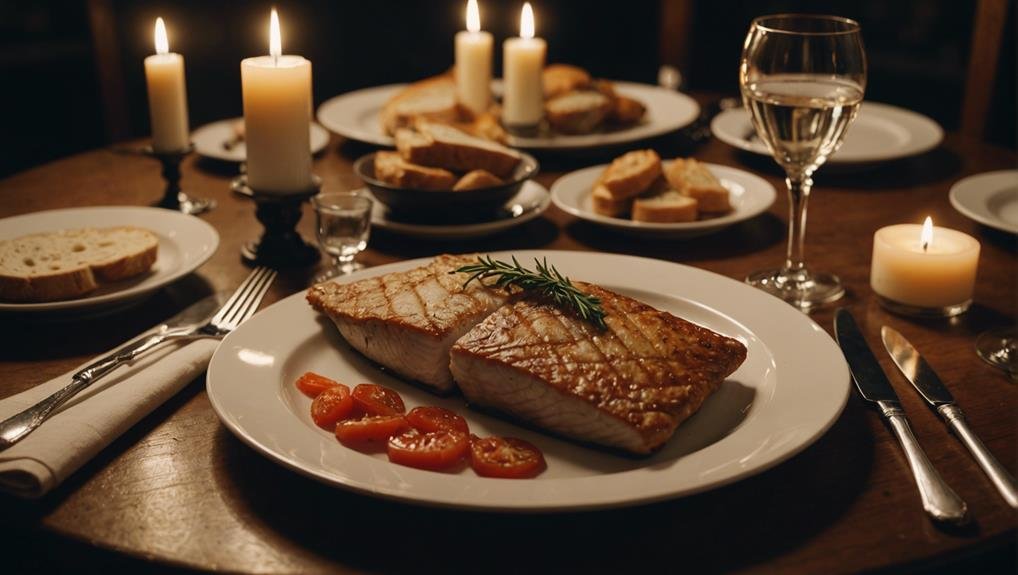Eating meat on Good Friday might make you wonder about the implications for your faith and community. This day holds significant importance in the Christian calendar, and breaking the tradition of abstinence can lead to feelings of guilt or internal conflict. You may question the impact on your religious observance and how others perceive your actions. But what if you accidentally Eat Meat on Good Friday, or if there are specific exceptions to this rule? Understanding the deeper reasons behind this practice can shed light on its importance and the potential consequences of not adhering to it.
Key Takeaways
- Eating meat on Good Friday intentionally is considered a violation of Church discipline and can be seen as sinful.
- Accidental meat consumption is less likely to be considered sinful, as intent determines the act’s severity.
- The act can lead to personal feelings of guilt, remorse, and questioning one’s religious commitment.
- The Church recognizes exceptions for health concerns and provides dispensations to ensure well-being.
- Observing abstinence from meat on Good Friday honors the significance of Jesus Christ’s crucifixion and promotes spiritual discipline.
Significance of Good Friday
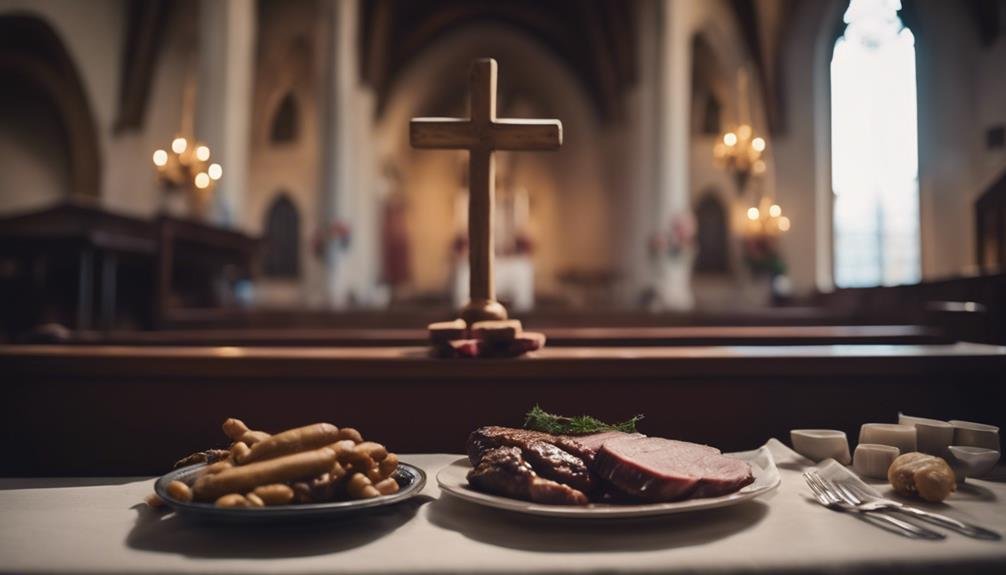
Good Friday is significant because it commemorates Jesus Christ’s crucifixion and death. This solemn day invites you to reflect deeply on Jesus’s sacrifices for humanity. It’s a time to pause from your daily routine and engage in fasting, prayer, and contemplation.
Reflecting on Jesus Christ’s crucifixion can be a powerful experience. You might think about His immense suffering and what His ultimate sacrifice means for your faith. This reflection isn’t just about sorrow; it’s also a moment to appreciate the depth of His love and commitment to humankind.
Fasting on Good Friday is a traditional practice that enhances this reflection. By abstaining from certain foods, you join millions of Christians worldwide in a shared act of penance and humility. This fast isn’t just about depriving yourself; it’s about creating space for spiritual growth and a deeper connection with your faith.
When you think about Jesus Christ’s crucifixion, fasting, and reflection, you gain a richer, more meaningful understanding of Good Friday. This day, marked by both solemnity and gratitude, helps you honor the profound impact of Jesus’s sacrificial love.
Church’s Dietary Mandates
You’ll encounter evolved historical requirements when examining the Church’s dietary mandates for Good Friday. Canon Law provides specific guidelines on fasting and abstinence, including allowances and exceptions.
Understanding these rules helps you appreciate the significance behind these practices.
Historical Church Requirements
Understanding the historical dietary mandates of the Catholic Church reveals how traditions like abstaining from meat on Fridays have evolved over centuries.
Historically, the Church required abstinence from meat on all Fridays, not just Fridays during Lent. This practice was formalized in 866 AD when Pope Nicholas I established universal Friday meat abstinence. The aim was to foster a spirit of penance and reflection among the faithful.
Abstaining from meat on Good Friday is particularly significant because it commemorates the crucifixion of Jesus Christ. Fridays during Lent, including Good Friday, became special days of penitential practice, emphasizing sacrifice and spiritual discipline. The mandate required all Catholics aged 14 and older to follow these dietary restrictions.
Over time, the Church’s requirements evolved. In 1983, the revised canon law limited mandatory abstinence to Ash Wednesday and Good Friday. However, many Catholics still observe the traditional practice of abstaining from meat on all Fridays during Lent as a form of personal devotion.
These historical mandates reflect the ongoing evolution of Church practices, adapting to cultural changes while maintaining core elements of faith and discipline. Understanding these requirements helps you appreciate the depth and history behind the tradition of meat abstinence.
Canon Law Guidelines
Following Canon Law guidelines, Catholics aged 14 and older are required to abstain from meat on Good Friday to honor the crucifixion of Jesus Christ. This directive is fundamental to the Catholic Church’s spiritual discipline and reverence expectations.
Refraining from meat means engaging in a longstanding that symbolizes penance and contemplation of Jesus’ longstanding. Longstanding dietary regulations are explicit: Catholics are expected to steer clear of flesh meat on days of penance like Good Friday. Abstaining from meat isn’t merely a ritual but a significant practice linking you to the Catholic faith’s fundamental beliefs. It serves as a way to express solidarity with Jesus’ suffering and to enrich your spiritual journey.
Disregarding this mandate without a valid reason may be viewed as defiance of Church teachings. Adhering to these dietary requirements is crucial not just as a regulation but as a manifestation of your faith and dedication.
Observing abstinence from meat on Good Friday poignantly reminds us of the day’s spiritual importance, prompting us to live our faith with devotion and reverence for tradition.
Exceptions and Dispensations
Catholic Church guidelines provide exceptions and dispensations for those unable to abstain from meat on Good Friday due to health concerns or dietary restrictions. The Church understands Churchkes accommodations if you have a medical condition requiring a specific diet, including meat. Dispensations are granted to guarantee that your health and well-being aren’t compromised. You can obtain these dispensations from a priest or local bishop when you present valid reasons.
The Church emphasizes the spirit of the law over strict legalistic adherence. This means that while the tradition of abstaining from meat on Good Friday is important, the Church recognizes legitimate circumstances where following this rule mightn’t be possible or advisable. For example, if you’re in a situation with limited food options that don’t meet your dietary needs without meat, you’re not expected to suffer or put your health at risk.
However, even with these exceptions and dispensations, the Church encourages churches to adhere to the guidelines whenever possible. This practice is seen as a way to honor the significance of Good Friday and engage in spiritual reflection and sacrifice.
Historical Origins
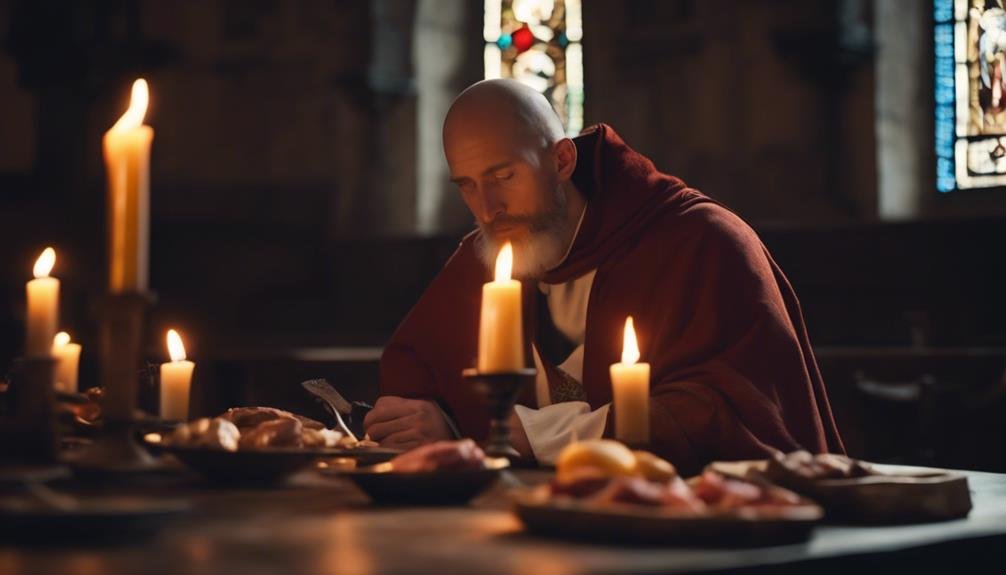
Abstaining from meat on Fridays has deep historical roots within the faith. Early Christians viewed Fridays as a day of penance in commemoration of Jesus’ crucifixion. This tradition was further solidified when Pope Nicholas I made abstinence from eating meat a universal rule in 866 AD. By doing so, he emphasized the importance of penance and sacrifice, particularly on the Fridays of Lent. Failing to adhere to this practice was often considered a mortal sin, underscoring its significance during this period.
Initially, all Catholics were required to abstain from meat every Friday, not just during Lent. The idea was to cultivate a spirit of penance and reflection throughout the year. However, the revised code of canon law in 1983 made some adjustments. It limited the mandatory abstinence to Ash Wednesday and Good Friday, although the practice during Fridays of Lent remained deeply rooted for many.
The rule applies to Catholics aged 14 and older, reinforcing the practice of penance from a young age. While the Church’s guidelines, the historical significance of abstaining from meat on Good Friday remains a profound aspect of Catholic tradition.
Biblical References
While the Bible doesn’t explicitly prohibit eating meat on Good Friday, it emphasizes the importance of fasting and penance. Catholics follow this tradition to commemorate the crucifixion of Jesus Christ. In the scriptures, fasting is often associated with repentance and spiritual discipline. For instance, in the Old Covenant, the Book of Isaiah (58:6-7) speaks about fasting to humble oneself before God and act kindly. Similarly, the New Covenant highlights fasting as a practice of devotion, such as in Matthew 6:16-18, where Jesus advises on how to fast sincerely.
The practice of abstaining from meat on Good Friday isn’t directly mentioned in biblical references but has become a significant tradition within the Catholic Church. Pope Nicholas I established Friday meat abstinence as a universal rule in 866 AD, rooted in the broader biblical themes of sacrifice and penance. Catholics observe this practice to honor Christ’s sacrifice and align their actions with the spirit of repentance and reflection the Bible encourages.
While eating meat on Good Friday isn’t biblically forbidden, abstaining from it is a way for Catholics to deepen their spiritual connection and commemorate Christ’s sacrifice.
Intentional Vs. Unintentional Eating
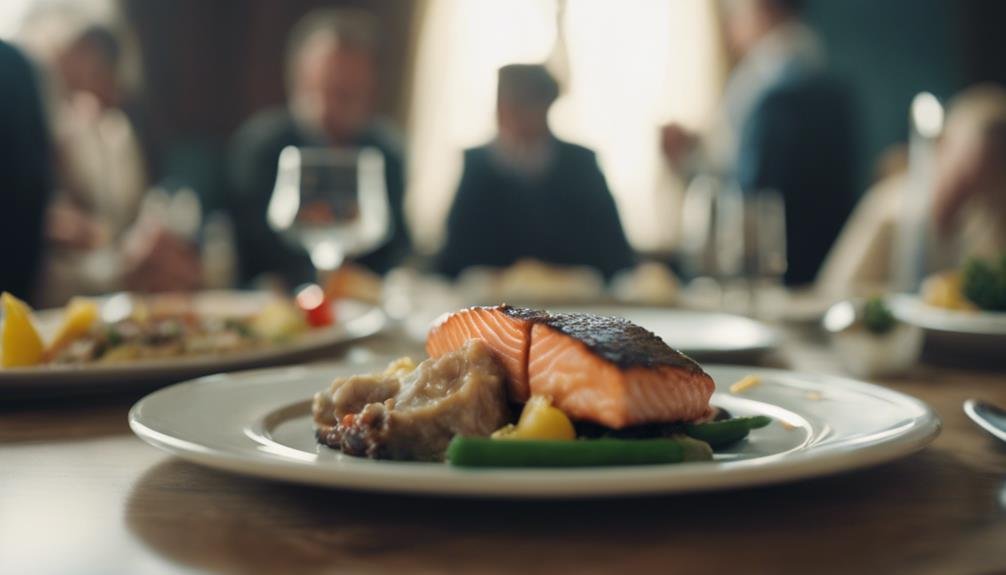
Understanding the religious significance of Good Friday means knowing the importance of your intent when it comes to eating meat.
If you accidentally eat meat, the consequences might be less severe, considering your lack of awareness.
To avoid unintentional consumption, be mindful of what you eat and plan your meals accordingly.
Understanding Religious Significance
Intentional meat consumption on Good Friday directly disobeys Church rules, highlighting the importance of intent in religious observance. If you knowingly choose to eat meat on this solemn day, you’re not just breaking a dietary guideline—you’re committing an act of disobedience. The Church sees this as Church because it reflects a deliberate disregard for the practice of abstinence, which is meant to honor the sacrifice of Jesus Christ.
Unintentional eating, however, is different. If you accidentally consume meat without realizing it’s Good Friday, the sinfulness isn’t the same. Here’s why:
- Intent Matters: Sin is often determined by your intent. Eating meat knowingly is a conscious choice to ignore Church teachings.
- Awareness: If you’re unaware that it’s Good Friday, your action doesn’t carry the same weight as disobedience.
- Obedience: The Church values your willingness to follow its rules, even if mistakes happen.
- Respect for Discipline: Observing abstinence shows respect for the Church’s guidance and the significance of Good Friday.
Understanding the religious significance helps you navigate these rules more meaningfully, ensuring your actions align with your faith’s expectations.
Potential Consequences Explained
Eating meat on Good Friday can have different consequences, intentional or unintentional. If you intentionally eat meat on this sacred day, it’s seen as a direct violation of Church discipline. This deliberate act, given your awareness and intent, is considered sinful. The significance of this sin can vary, but knowingly choosing to disobey the teachings does carry spiritual consequences.
On the other hand, if you accidentally consume meat without prior knowledge that it’s Good Friday or without realizing its importance, the situation changes. The lack of intent and awareness generally means it’s not viewed as sinful. The Church understands Churchccidents happen, and without deliberate disobedience, you’re less likely to face severe consequences.
Context plays an important role here. Your intent and awareness determine whether the act is a grave sin or a simple mistake.
Mitigating Unintentional Consumption
To mitigate unintentional meat consumption on Good Friday, you can take several proactive steps to guarantee you adhere to the tradition. It’s crucial to distinguish between intentional disobedience and unintentional consumption. While the former is considered sinful due to deliberate intent, the latter may be forgiven if it stems from a lack of awareness or forgetfulness.
Here are four steps you can take to avoid unintentional consumption:
- Plan Your Meals: Before Good Friday, plan a menu with only permitted foods. This preparation reduces the risk of accidentally eating meat.
- Set Reminders: Use alarms or notes on your phone or around your home to remind yourself and your family about abstinence from meat. This helps prevent any lapses due to forgetfulness.
- Inform Others: Make sure those around you know the tradition, especially those who might prepare or share meals with you. This collective awareness can prevent accidental meat consumption.
- Check Ingredients: When eating out, be vigilant about reading labels and asking about ingredients. Sometimes, meat products can be hidden in dishes where you least expect them.
Emotional Impact
Accidentally eating meat on Good Friday can leave you grappling with feelings of disappointment and regret. The emotional impact of this unintentional act can be profound, especially if you place significant importance on religious observance. You might feel guilty, feeling you’ve failed to honor a longstanding guilt. It can longstanding longstanding spirituality.
Tlllongstandingte these emotions, consider reflecting on the situation and seeking forgiveness. Acknowledging your feelings and understanding that mistakes happen can be the first step toward emotional healing. Discussing the matter with a spiritual advisor or praying can also provide comfort and alleviate some emotional burdens.
Here’s a quick guide to managing your feelings after eating meat on Friday:
| Feeling | Cause | Solution |
|---|---|---|
| Disappointment | Breaking a significant religious practice | Reflect on your intentions |
| Regret | Unintentional consumption | Accept that mistakes happen |
| Guilt | Perceived failure in observance | Seek forgiveness through prayer |
| Discomfort | Conflict with personal beliefs | Talk to a spiritual advisor |
| Self-Reflection | Questioning your commitment | Reaffirm your dedication moving forward |
Religious Implications
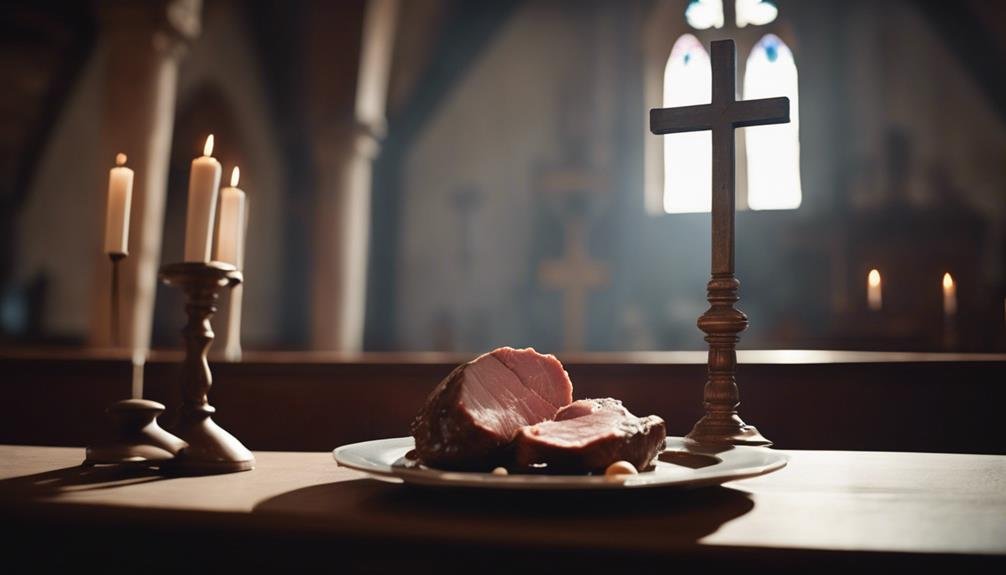
When you unintentionally consume meat on Good Friday, understanding the religious implications can help you navigate your spiritual journey more confidently. Good Friday is one of the most significant Days of Penance in the Catholic Church, meant to honor Christ’s death by participating in collective mourning and reflection on Jesus’ sacrifice. Accid by abstaining from maternal consumption, while understandable, still invites you to ponder the deeper meaning behind the tradition.
Here are key points to ponder:
- Sacrifice Something: Abstaining from meat symbolizes a personal sacrifice, aligning with the broader theme of Christ’s death and suffering.
- Obedience to Teachings: The Church’s call to abstain from meat is a directive aimed at fostering spiritual discipline and humility. Intentional disobedience can be seen as a sin, emphasizing the importance of adhering to religious guidelines.
- Days of Penance: Good Friday is a solemn day that encourages reflection on one’s faith and actions. Observing abstinence is a way to participate in this collective penance.
- Spiritual Reflection: If you accidentally eat meat, take it as an opportunity to deepen your understanding and commitment to the faith rather than as a mere oversight.
Understanding these aspects can strengthen your connection to the tradition and its spiritual significance.
Exceptions and Dispensations
Sometimes, exceptions and dispensations are granted for valid reasons regarding eating meat on Good Friday. You may be eligible for a dispensation if you have a medical condition or strict dietary requirements necessitating meat consumption. Bishops and priests can provide these dispensations, considering the individual circumstances and specific needs that justify such an exception.
For instance, if your health relies on a protein-rich diet that can only be met by eating meat, this could be considered an important reason. Similarly, if you accidentally consume meat without realizing it’s Good Friday, it’s generally not considered sinful. The intent and knowledge behind your actions play a significant role in determining whether it’s an issue.
When considering individual circumstances, the Church aims to balance and adhere to Church religious practices with compassion and understanding of personal needs.
Alternative Observances

Instead of eating meat on Good Friday, you can choose from alternative observances that honor the day’s significance. One common practice is abstaining from eating meat entirely, opting for fish, eggs, dairy, or vegetarian meals. Many cultures have traditional meatless recipes perfect for this day, allowing you to participate meaningfully without compromising taste.
Another important aspect of Good Friday is the focus on penance and reflection on Jesus’ sacrifice. Some individuals choose to fast completely or limit themselves to one full meal and two smaller snacks. This act of self-denial can deepen your spiritual experience and connection to the day’s solemnity.
Participating in Good Friday church services or engaging in Stations of the Cross can be powerful alternative observances. These activities provide an opportunity for prayer and contemplation, reinforcing the day’s spiritual focus.
Consider these meaningful ways to observe Good Friday:
- Prepare a traditional meatless meal, such as a fish dish or vegetable-based recipe.
- Fast or eat minimally, reflecting on the theme of penance.
- Attend a Good Friday church service to join in communal prayer.
- Perform acts of charity to embody the spirit of sacrifice and compassion.
Conclusion
If you eat meat on Good Friday, you might feel guilt or remorse, especially if you value religious traditions. It could disrupt the day’s solemnity and create internal conflict about your faith.
Socially, it might be viewed unfavorably in some communities. However, understanding the Church’s guidelines, seeking Church’sess, and considering alternative observances can help you navigate these feelings and maintain your spiritual commitment.
Respecting the day’s significance strengthens your connection to your faith.
FAQs
Why do some Christians avoid eating meat on Good Friday?
Many Christians, particularly Catholics, abstain from eating meat on Good Friday as a form of penance and reflection on Jesus Christ’s suffering and sacrifice. Good Friday is the day Christians commemorate the crucifixion of Jesus, and abstaining from meat symbolizes self-denial and spiritual discipline. Instead of beef, many choose to eat fish or vegetarian meals.
Key Points:
- Abstaining from meat is a form of penance.
- Symbolizes self-denial and reflection on Christ’s sacrifice.
- A common practice among Catholics during Lent.
Is eating meat on Good Friday a sin?
For Catholics and some other Christian denominations, eating meat on Good Friday is considered a violation of the Church’s teachings on fastingChurch’stinence. However, it is not considered a sin that leads to grave consequences but rather an act against penance during Lent. There are exceptions for people with health issues, the elderly, or young children.
Key Points:
- She is considered a violation of Lenten’s abstinence rules for Catholics.
- They are not considered a grave sin but a deviation from tradition.
- Exceptions exist for health, age, and other factors.
What are alternatives to eating meat on Good Friday?
Instead of eating meat, many people opt for fish or vegetarian meals on Good Friday. Fish is often considered acceptable because, historically, meat was associated with celebrations, while fish was viewed as a simple, humble food. Popular alternatives include:
- Fish: Grilled, baked, or fried fish is a common choice.
- Vegetarian Dishes: Lentil soups, vegetable casseroles, or pasta.
- Seafood: Shrimp, clams, or other shellfish can also be enjoyed.
Alternatives:
- Fish, such as grilled or baked options.
- Vegetarian meals like soups and casseroles.
- Seafood like shrimp and shellfish.
Why is fish allowed but not meat on Good Friday?
The tradition of eating fish but abstaining from meat on Good Friday is rooted in historical practices where red meat (such as beef, pork, and chicken) was considered a luxury or celebratory food. On the other hand, fish was seen as a more humble, simple food, aligning with the idea of penance and modesty during Lent’s solemn time.
Key Points:
- Red meat is seen as luxurious or celebratory.
- Fish are considered humble, fitting with penance practices.
- Reflects simplicity and self-denial during Lent.
Who is required to abstain from meat on Good Friday?
In the Catholic Church, all Catholics aged 14 and older must abstain from meat on Good Friday, Ash Wednesday, and all Fridays during Lent. However, certain groups, such as the elderly, the sick, pregnant or nursing women, and young children, are exempt from this requirement.
Key Points:
- Catholics aged 14 and older are required to abstain.
- Exemptions exist for health reasons, such as for her people and children.
